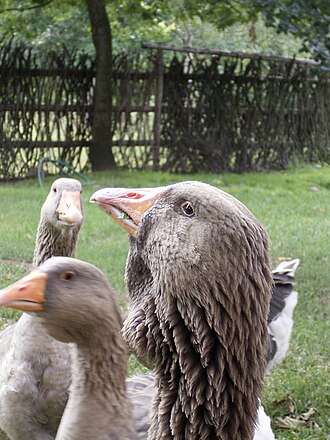Difference between revisions of "Translations:AY Honors/Poultry Raising/Answer Key/61/en"
(Importing a new version from external source) |
(Importing a new version from external source) |
||
| Line 1: | Line 1: | ||
</noinclude> | </noinclude> | ||
| − | {{: | + | {{:AY Honors/Poultry/Toulouse Goose}} |
Latest revision as of 01:27, 20 September 2021
Toulouse goose
The Toulouse goose has greyish-brown feathers on top, with white feathers underneath. The most distinguishing characteristic is a pronounced dewlap, which is a flap of loose skin beneath the chin. The bird is of a very trusting nature and has a very placid disposition, with the consequence that these birds do not thrive in flocks of mixed breeds. The more active and aggressive breeds will greatly distress the bird, putting them of mating and sometimes resulting in them losing out at the feeding trough. They are very domestic birds and will easily be bewildered by more active breeds if mixed. They do not need water or a pond and the geese never mate in water. They rarely have problems producing fertile eggs, although problems can occur during severe weather in the winter and spring, which is the case with most breeds of geese. The breed is a good layer of eggs and will equal the best of any goose breed. A good goose will lay up to 100 eggs a year. However the birds are not good sitters, the sitting habit having been bred out of some birds. The breed makes an excellent table bird. The geese are not great wanderers and preferring to stay close to home making them ideal for a large garden or an orchard where the birds will thrive.

